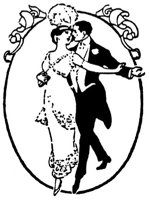
|
Folk Dance Federation of California, South, Inc.
Victorian Etiquette |

|
CLICK AN IMAGE TO ENLARGE
Quoted from Nineteenth Century Dance Manuals
We can only hint at certain violations of etiquette which are practised.
These will be offered, not with oracular confidence, but respectful deference, to the consideration of our patrons.
 The appointed hour of a ball should be adhered to as nearly as possible. When you enter at a late hour, you appear to be of great importance in your own estimation.
The appointed hour of a ball should be adhered to as nearly as possible. When you enter at a late hour, you appear to be of great importance in your own estimation.
On entering a ball-room, all thought of self should be dismissed. The petty ambition of endeavoring to create a sensation by either dress, loud talking, or unusual behavior, is to be condemned.
Let your countenance be expressive of cheerfulness and gaiety, and let an agreeable smile ever play about your mouth.
Do not cross the ball-room in an anxious manner, or force your way to a lady to merely receive a bow, as by so doing you attract the attention of the company to her. If you are desirous of being noticed by any particular persons, put yourself in their way as if by accident, and do not let it be seen that you have sought them out.
Don't be in a hurry to get to a chair. It is just as graceful and proper to stand.
In public balls, a gentleman offers his partner refreshments, but which she seldon accepts, unless she is well acquainted with him.
Dance as others do, with ease. It has a very absurd look to take every step with dancing-school accuracy, and your partner will be the first one to notice it.
Pay attention to the dance, but not so marked as to appear as if that attention were necessary to prevent a mistake.
It is improper for two gentlemen to dance together when ladies are present.
There is perhaps no occasion in which the necessity of gracefulness is so important than in dancing. We do not, of course, allude to stage dancing, which would be beneath contempt without grace.
When invited to dance, the lady will hand her ball card to the gentleman, who will put his name in one of the vacant places.
It is not in conformity with the rules of etiquette for a young lady to dance with one gentleman repeatedly, to the exclusion of all others who may solicit her hand, even though the favored man be her suitor.
A gentleman may, however, without impropriety ask a lady to join him the second time in a dance. He should treat all courteously, and not manifesting preference for any one in particular, be ready to dance whomever may need a partner.
A lady who declines dancing with a gentleman should afford him some reason for her refusal, no matter how frivolous; and no gentleman should compromise his self respect by manifesting any displeasure, even if the lady by whom he was refused exhibits bad taste by immediately dancing with another, for in these matters ladies are exempt from all explanations.
If a lady has promised to be your partner for a dance, do not neglect her when the time comes, but be in readiness to fulfill your office as her cavalier, or she may think that you hav studiously slighted her, besides preventing her from obliging someone else.
If you are so unfortunate as, forgetting a prior engagement, to engage yourself to two partners for the same dance, decline dancing it altogether, or you will surely offend one of them.
While dancing, a lady should consider herself engaged to her partner, and therefore not at liberty to hold a flirtation, between the figures, with another gentleman.
It is best at a ball, for a lady to dance only every other dance, as over-fatigue, and probably a flushed face, will follow too much dancing. Decline the intermediate dances on the plea of fatigue.
Loud conversation, profanity, stamping the feet, writing on the wall, smoking tobacco, or throwing anything on the floor, are strictly forbidden.
The practice of chewing tobacco and spitting on the floor is not only nauseous to ladies, but is injurious to their dresses. They who possess self-respect will surely not be guilty of such conduct.
Etiquette requires both study and memory, as its rules are often arbitrary.
Used with permission of the author.